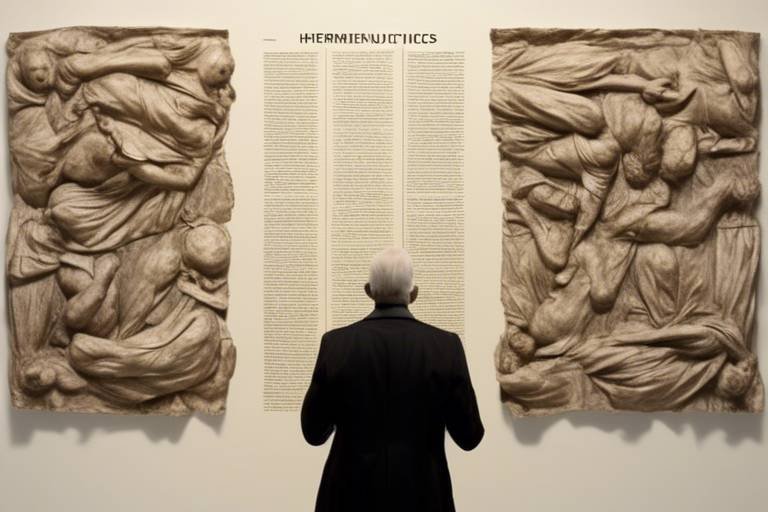Is perfection the ultimate philosophical goal?
The quest for perfection has intrigued philosophers, thinkers, and everyday individuals for centuries. But what does it really mean to achieve perfection? Is it a tangible goal, or merely an abstract concept that eludes us? In this exploration, we will dive deep into the philosophical implications of perfection, examining its significance, challenges, and how it resonates in our contemporary lives. Many of us chase after an idealized version of ourselves, whether in our careers, relationships, or personal growth, but is this pursuit truly worthwhile? Or does it lead us down a path of frustration and disappointment?
In a world that often celebrates success and achievement, the idea of perfection can become a double-edged sword. While it can motivate us to strive for greatness, it can also create unrealistic expectations that lead to stress and anxiety. So, is perfection the ultimate goal we should be aiming for? Or should we shift our focus to more attainable aspirations that bring genuine fulfillment? As we navigate through various philosophical perspectives, we will uncover the layers of perfection, challenging the notion that it is the pinnacle of human existence.
To understand perfection, we must first consider its nature. Throughout history, philosophers have grappled with what perfection means, leading to a myriad of definitions and interpretations. Some view it as an ideal state that is fundamentally unattainable, while others argue that it can be approached through continuous improvement and self-reflection. This divergence in thought not only highlights the complexity of perfection but also raises essential questions about our motivations and desires. Are we truly seeking perfection, or are we merely chasing an illusion that society has constructed?
As we embark on this philosophical journey, we will explore the thoughts of key thinkers such as Plato and Kant, who have shaped our understanding of perfection in distinct ways. Through their lenses, we will examine the implications of pursuing perfection and whether it serves as a guiding principle in our lives or a source of perpetual dissatisfaction. Join us as we delve into the intricate relationship between perfection and the human experience, ultimately questioning whether this lofty goal is one we should continue to pursue.
- What is the philosophical definition of perfection? Philosophically, perfection is often understood as a state of completeness and flawlessness, an ideal that may exist in abstract forms but is rarely, if ever, fully realized in the material world.
- Can perfection ever be achieved? Many philosophers argue that while we can strive for perfection, it is inherently unattainable. The journey toward personal growth and understanding may be more valuable than the destination itself.
- What are the psychological effects of striving for perfection? Striving for perfection can lead to significant stress and anxiety, as individuals may feel overwhelmed by the pressure to meet unrealistic standards.
- Are there alternative goals to perfection? Yes, many alternative philosophical goals such as authenticity, fulfillment, and happiness are often seen as more attainable and meaningful pursuits in life.

The Nature of Perfection
Understanding what perfection truly means is essential in philosophical discussions. Throughout history, the concept of perfection has been interpreted in various ways, reflecting the complexities of human thought and experience. At its core, perfection can be seen as an ideal state, a condition where everything is flawless and complete. However, this idealistic view often clashes with our realistic experiences, where imperfections are a part of life. So, what does it really mean to be perfect? Is it an attainable goal, or merely a mirage that we chase?
Historically, philosophers have grappled with these questions, attempting to define perfection through different lenses. For instance, in ancient times, perfection was often associated with the divine or the eternal. Thinkers like Aristotle suggested that perfection could be found in the fulfillment of one’s purpose, or telos, thus linking it to the idea of achieving one’s potential. This perspective shifts the focus from an unattainable ideal to a journey of self-improvement and realization.
In more contemporary thought, perfection is frequently viewed through the lens of subjectivity. What may be considered perfect for one person could be seen as flawed by another. This subjectivity raises intriguing questions about the nature of perfection itself. Can we truly define perfection in absolute terms, or is it a relative concept shaped by individual experiences and societal norms? For instance, in the realm of art, a piece may be deemed perfect by one critic while another may find it lacking. This leads us to ponder: is perfection a universal standard, or is it merely a reflection of personal taste?
To further complicate matters, the pursuit of perfection often comes with its own set of challenges. Many individuals strive for perfection in various aspects of life—be it in their careers, relationships, or personal development. However, this quest can lead to feelings of inadequacy and disappointment when reality fails to meet their lofty expectations. In fact, a study by the American Psychological Association found that individuals who identify as perfectionists are more likely to experience anxiety and depression. This highlights a crucial point: while perfection may be an alluring goal, the journey toward it can be fraught with emotional turmoil.
Thus, the nature of perfection remains a deeply philosophical question, one that invites us to explore our values, aspirations, and the very essence of what it means to live a fulfilling life. As we navigate this complex landscape, it’s essential to recognize that perfection, in its many forms, may not be the ultimate goal after all. Instead, perhaps the pursuit of authenticity or fulfillment could provide a more meaningful and attainable path.
- What is perfection in philosophy? Perfection in philosophy refers to an ideal state of flawlessness that is often debated in terms of its attainability and relevance in human life.
- Is perfection subjective? Yes, perfection can be subjective, as different individuals may have varying definitions and standards of what constitutes perfection based on personal experiences and cultural influences.
- Can the pursuit of perfection be harmful? Yes, striving for perfection can lead to negative psychological effects such as anxiety and depression, particularly for those who identify as perfectionists.
- What are some alternatives to perfection? Alternatives to perfection include the pursuit of authenticity, fulfillment, and happiness, which may offer a more realistic and meaningful approach to life.

Philosophical Perspectives on Perfection
When we dive into the realm of philosophical perspectives on perfection, we quickly discover that this concept is anything but straightforward. Different thinkers throughout history have approached perfection from various angles, each contributing unique insights that enrich our understanding. For instance, the ancient Greeks, particularly Plato, viewed perfection as something that exists beyond our tangible world. He proposed that what we perceive in our daily lives is merely a shadow of a higher reality, filled with ideal forms that represent true perfection. This perspective can be likened to a painter trying to capture the essence of a sunset; no matter how skilled, the painting can never fully encapsulate the breathtaking beauty of the real thing.
On the other hand, Immanuel Kant introduced a contrasting viewpoint, linking perfection closely with moral duty. For Kant, perfection isn't just an abstract concept; it's tied to our ethical obligations and the pursuit of a moral life. He argued that to be perfect is to fulfill our duties to ourselves and others, implying that perfection is not just an ideal to aspire to but a practical guideline for living. This raises a compelling question: can we ever truly be perfect in our moral obligations, or is the pursuit itself what truly matters? Kant's ideas challenge us to think about the implications of perfection in our everyday choices and actions.
Furthermore, we can observe how Eastern philosophies, such as Buddhism, interpret perfection. Rather than striving for an unattainable ideal, Buddhism encourages followers to seek enlightenment and understanding of the self. This perspective shifts the focus from perfection as a goal to the journey of self-discovery and acceptance. It emphasizes that embracing our imperfections can lead to a more profound sense of fulfillment and peace. This approach resonates deeply in a world where societal pressures often dictate unrealistic standards of success and achievement.
To summarize, the philosophical perspectives on perfection are diverse and multifaceted. They range from the idealistic views of Plato to the moral frameworks of Kant and the introspective insights of Eastern philosophies. Each perspective offers valuable lessons on how we can approach perfection in our lives. Here’s a brief comparison of these views:
| Philosopher | Perspective on Perfection | Key Ideas |
|---|---|---|
| Plato | Idealism | Perfection exists in an abstract realm; our world is merely a shadow of these ideals. |
| Kant | Moral Duty | Perfection is linked to fulfilling moral obligations and ethical living. |
| Buddhism | Self-Acceptance | Focus on enlightenment and understanding rather than striving for unattainable ideals. |
In conclusion, the philosophical discussions surrounding perfection invite us to reflect on our own beliefs and aspirations. Whether we view perfection as an ideal to strive for, a moral obligation, or a journey of self-acceptance, these perspectives challenge us to think critically about what it means to lead a fulfilling life.
- What is the main idea behind Plato's theory of forms? Plato believed that true perfection exists in a realm of ideal forms, which are the ultimate reality beyond our material world.
- How does Kant's view of perfection differ from Plato's? While Plato focuses on abstract ideals, Kant emphasizes moral duty and ethical living as central to the concept of perfection.
- Can perfection be achieved according to Eastern philosophies? Eastern philosophies like Buddhism suggest that perfection is less about achieving an ideal and more about self-acceptance and enlightenment.

Plato and the Ideal Forms
Plato's philosophical journey takes us into the realm of the Ideal Forms, a concept that fundamentally reshapes our understanding of reality and perfection. According to Plato, the physical world we inhabit is merely a shadow of a higher, unchangeable reality where the true essence of things resides. Imagine a world where every object, idea, or virtue exists in its perfect state—this is the world of the Ideal Forms. For Plato, perfection is not just an abstract notion but a tangible reality that we can only glimpse through reason and intellect.
In Plato's view, the Ideal Forms represent the ultimate truth, standing in stark contrast to the flawed manifestations we encounter daily. For example, consider the concept of a circle. In our physical world, no circle can be perfectly round; there will always be imperfections. However, in the realm of Ideal Forms, the perfect circle exists—flawless and complete. This distinction between the ideal and the material leads to profound implications for understanding perfection. Plato argues that our souls yearn for these ideals and that our pursuit of knowledge is essentially a quest to reconnect with these perfect forms.
Moreover, Plato categorizes these Ideal Forms into different realms, particularly emphasizing the Form of the Good, which he considers the highest of all forms. The Form of the Good illuminates all other forms, much like the sun brings light to the physical world. It is through this light that we can understand what is truly good, just, and beautiful. Thus, the pursuit of perfection, in Plato's philosophy, becomes intertwined with the pursuit of the Good, suggesting that to strive for perfection is also to strive for a higher moral and ethical existence.
However, this lofty ideal presents a significant challenge: if perfection exists in an abstract realm, can we ever truly attain it in our flawed, material world? Plato's theory implies that while we can aspire towards these ideals, the journey itself may be more important than the destination. This perspective encourages a continuous quest for improvement and understanding, urging us to embrace the imperfections of our reality while striving for a deeper comprehension of the ideals that guide our lives.
In summary, Plato's Ideal Forms offer a compelling framework for understanding perfection. They invite us to reflect on the nature of reality and challenge us to consider whether the ultimate goal of human existence is to achieve perfection or to engage in the quest for understanding and meaning. As we navigate through life, the Ideal Forms serve as a guiding light, inspiring us to seek not just knowledge but also a deeper connection to the values that define our humanity.

Kant's Moral Philosophy
Immanuel Kant, a towering figure in the realm of philosophy, offered a revolutionary perspective on ethics that intertwines the concept of perfection with moral duty. For Kant, the ultimate goal of human life is not merely the pursuit of happiness but the realization of a moral law that exists within us. He argued that true moral actions stem from a sense of duty, which he termed the Categorical Imperative. This principle asserts that one should act only according to that maxim whereby they can, at the same time, will that it should become a universal law. In simpler terms, if your action can be universally applied without contradiction, it is morally permissible.
Kant believed that moral perfection is an achievable aim, albeit one that requires rigorous self-discipline and adherence to ethical principles. He distinguished between two kinds of perfection: moral perfection and practical perfection. Moral perfection involves the alignment of one's actions with moral law, while practical perfection pertains to the cultivation of virtues that allow individuals to act in accordance with their moral duties. This duality presents a compelling framework for understanding how perfection can be integrated into our daily lives.
Furthermore, Kant's philosophy emphasizes the importance of autonomy and rationality in the pursuit of moral perfection. He posited that individuals possess the capacity to reason and make moral choices independent of external influences. This idea of autonomy is crucial because it implies that each person is responsible for their own moral development. The pursuit of perfection, therefore, becomes a personal journey, marked by the struggle to align one's actions with rational moral principles.
However, Kant also recognized the inherent limitations of human beings in achieving absolute perfection. He argued that while we can strive for moral excellence, we must also acknowledge our imperfections and the challenges that accompany our moral endeavors. This acknowledgment fosters a sense of humility and encourages continuous self-improvement. In this light, the pursuit of perfection is not about achieving a flawless state but rather about the ongoing commitment to ethical living.
To summarize, Kant's moral philosophy presents a nuanced understanding of perfection that intertwines duty, autonomy, and rationality. It challenges us to consider not only what it means to be perfect but also how we can navigate the complexities of moral life. In a world where ethical dilemmas abound, Kant's insights remain profoundly relevant, prompting us to reflect on our moral choices and the ideals we aspire to.
- What is Kant's Categorical Imperative?
The Categorical Imperative is a central philosophical concept in Kant's moral philosophy, stating that one should act only according to maxims that can be universally applied.
- How does Kant view the relationship between happiness and morality?
Kant believes that morality should not be solely based on the pursuit of happiness; rather, moral actions arise from a sense of duty dictated by rationality.
- Can perfection be achieved according to Kant?
While Kant acknowledges that absolute moral perfection may be unattainable, he emphasizes the importance of striving for moral excellence through self-discipline and adherence to ethical principles.

The Pursuit of Perfection in Human Life
The quest for perfection is a deeply ingrained aspect of human nature. From the moment we take our first steps, there’s an innate desire to improve, to be better than we were yesterday. This drive often manifests in various facets of our lives, whether it's in our personal development, relationships, or careers. But why do we chase after something that seems so elusive? Is perfection a destination, or is it merely a mirage that distracts us from appreciating the journey? As we delve into this topic, it’s crucial to understand that the pursuit of perfection can be both a source of motivation and a potential pitfall.
In the realm of personal development, many individuals set lofty goals, fueled by the belief that achieving perfection will bring them happiness and satisfaction. They might engage in rigorous self-improvement routines, meticulously planning every aspect of their lives. This can include everything from fitness regimes to academic achievements. However, this relentless pursuit often leads to feelings of inadequacy and frustration when perfection remains just out of reach. The irony is that while striving for excellence can lead to significant achievements, it can also result in a perpetual sense of dissatisfaction.
When it comes to relationships, the desire for perfection can be equally complex. We often hold unrealistic expectations for ourselves and others, believing that a perfect relationship should be free of conflict and full of harmony. This can lead to disappointment and heartache when reality inevitably falls short. Instead of celebrating the beauty of imperfection—like the quirks and differences that make each relationship unique—many people find themselves fixated on an unattainable ideal. This fixation can create barriers, preventing genuine connection and understanding.
In the professional sphere, the pursuit of perfection can drive individuals to achieve remarkable feats. However, it can also lead to burnout and a toxic work culture. Many professionals find themselves caught in a cycle of overwork, believing that they must be perfect in every project to be valued. This often results in a lack of work-life balance and a decrease in overall well-being. It’s essential to recognize that while striving for high standards is commendable, it’s equally important to embrace mistakes as opportunities for growth.
In light of these challenges, it's worth considering whether the pursuit of perfection is worth the toll it can take on our mental health. A more balanced approach might involve setting realistic goals that prioritize progress over perfection. This shift in mindset can lead to greater satisfaction and a more fulfilling life. Instead of aiming for an ideal that may never be fully achievable, we can focus on being the best versions of ourselves, celebrating our unique journeys and the lessons learned along the way.
Ultimately, the pursuit of perfection is a double-edged sword. While it can inspire us to reach new heights, it can also trap us in a cycle of self-criticism and despair. Embracing imperfection and acknowledging our human limitations can lead to a more meaningful existence. So, the next time you find yourself chasing after perfection, consider asking yourself: what would happen if I allowed myself to be just good enough?
- What is the difference between perfection and excellence?
Perfection is often seen as an unattainable ideal, while excellence refers to striving for high standards within realistic limits. - Can the pursuit of perfection be beneficial?
Yes, it can drive motivation and achievement, but it’s important to balance this with self-compassion. - How can I manage my perfectionist tendencies?
Setting realistic goals, practicing self-compassion, and embracing mistakes as learning opportunities can help.

Perfectionism: A Double-Edged Sword
Perfectionism, while often seen as a commendable trait, can actually be a double-edged sword. On one side, the relentless pursuit of perfection can drive individuals to achieve remarkable feats, pushing boundaries and setting high standards for themselves. Think of it as a race car driver who meticulously fine-tunes their vehicle, striving for that perfect lap time. This commitment to excellence can lead to significant accomplishments in personal and professional spheres, enhancing skills and fostering growth.
However, the other edge of this sword reveals a darker reality. The quest for an unattainable ideal can lead to intense stress, anxiety, and feelings of inadequacy. Imagine standing at the edge of a cliff, looking down at the ocean below, knowing that the waves are crashing against the rocks—this is how it feels for many perfectionists. They are constantly battling their inner critic, which can make even the smallest mistakes feel catastrophic. This relentless self-scrutiny often results in a cycle of dissatisfaction and burnout.
Research has shown that perfectionism is linked to various psychological issues, including depression and anxiety disorders. The pressure to be perfect can create a fear of failure that paralyzes action, leading to procrastination and avoidance. For instance, a student may delay starting a project because they fear it won’t meet their impossibly high standards, thus missing deadlines and opportunities. This is where perfectionism shifts from a motivating force to a debilitating one.
Moreover, perfectionism can strain relationships. When individuals hold themselves to unrealistic standards, they may project these expectations onto others, leading to frustration and conflict. Consider a parent who expects their child to excel in every subject at school. This pressure can create a rift, as the child feels overwhelmed and unable to meet those expectations, resulting in resentment and emotional distance.
To better understand the dual nature of perfectionism, let’s explore some of its key characteristics:
| Positive Aspects | Negative Aspects |
|---|---|
| Drives achievement and success | Can lead to anxiety and stress |
| Encourages personal growth | Results in fear of failure |
| Fosters resilience | Can damage relationships |
| Promotes high standards | Leads to chronic dissatisfaction |
In conclusion, while perfectionism can be a powerful motivator, it is crucial to recognize its potential pitfalls. Balancing the drive for excellence with self-compassion and realistic expectations is key to harnessing its positive aspects while mitigating the negative impacts. Embracing the idea that imperfection is part of the human experience can lead to greater happiness and fulfillment in life.
Q: Is perfectionism always a bad thing?
A: Not necessarily. While it can lead to negative outcomes, a moderate level of perfectionism can drive individuals to achieve and excel.
Q: How can I overcome perfectionism?
A: Strategies include setting realistic goals, practicing self-compassion, and learning to embrace mistakes as part of the learning process.
Q: Can perfectionism affect my relationships?
A: Yes, it can create unrealistic expectations for yourself and others, leading to misunderstandings and conflicts.
Q: Is there a way to channel perfectionism positively?
A: Absolutely! Focus on personal growth and improvement rather than unattainable ideals, and celebrate small achievements along the way.

Challenges in Achieving Perfection
Striving for perfection can often feel like chasing a mirage in the desert. It’s alluring, shimmering in the distance, but as we approach, it seems to slip further away. The challenges in achieving perfection are numerous and complex, often rooted in both external and internal factors. One of the most significant hurdles is the pressure from society. We live in a world that constantly bombards us with images of success, beauty, and excellence, which can create unrealistic standards that are nearly impossible to meet. Think about it: social media platforms are filled with curated lives that showcase only the highlights, leading many to feel inadequate in comparison.
Moreover, the fear of failure plays a pivotal role in this pursuit. Many individuals are so paralyzed by the idea of not measuring up that they may avoid taking risks altogether. This fear can manifest in various ways, such as procrastination or self-sabotage, ultimately hindering progress toward any form of perfection. It's like standing at the edge of a diving board, heart racing, contemplating the leap into the unknown—will you soar or belly flop? This internal struggle can be debilitating.
The psychological impacts of perfectionism are another layer of this intricate puzzle. Perfectionists often experience heightened levels of anxiety and stress. They may set goals that are too lofty, leading to a cycle of disappointment when those goals are not met. This can create a vicious cycle where the desire for perfection breeds more anxiety, which in turn makes it even harder to achieve the perfection they seek. It's akin to running on a treadmill set to a steep incline; no matter how hard you push, you may feel like you're getting nowhere.
Additionally, the subjective nature of perfection complicates matters further. What one person views as perfect, another might see as flawed. This subjectivity can lead to endless comparisons and self-doubt. For example, in the realm of art, one critic might laud a painting for its boldness, while another may dismiss it as chaotic. This variance in perception can make it feel impossible to achieve a universally accepted standard of perfection.
Finally, the relentless pursuit of perfection can often lead to burnout. People may pour all their energy into achieving what they believe is perfection, neglecting their physical and mental health in the process. The irony is that in the quest for an ideal state, they may lose sight of what truly matters—personal happiness and fulfillment. In essence, the journey toward perfection can sometimes overshadow the joy of the journey itself.
In conclusion, while the idea of perfection is enticing, the challenges associated with achieving it are profound and multifaceted. From societal pressures to personal fears, the road to perfection is fraught with obstacles that can hinder personal growth and well-being. Understanding these challenges is the first step toward redefining our relationship with perfection, allowing us to embrace a more balanced and realistic approach to our goals.
- What is the main challenge in achieving perfection? The main challenge lies in societal pressures and the fear of failure, which can create unrealistic standards and hinder progress.
- How does perfectionism affect mental health? Perfectionism can lead to increased anxiety, stress, and feelings of inadequacy, as individuals set unattainably high goals for themselves.
- Is perfectionism always negative? While striving for excellence can be beneficial, perfectionism can become harmful when it leads to burnout or prevents individuals from enjoying their achievements.
- Can perfection be redefined? Yes, redefining perfection to focus on personal happiness and fulfillment rather than external standards can lead to a healthier mindset.

Alternative Philosophical Goals
When we think about the pursuit of perfection, it’s easy to get caught up in the idea that it’s the only goal worth striving for. However, many philosophers argue that there are alternative aspirations that can lead to a more fulfilling and meaningful life. These alternatives often emphasize the importance of being true to oneself, finding happiness, and living authentically. So, what are these philosophical goals that can serve as substitutes or complements to perfection?
One prominent alternative is the concept of authenticity. This idea suggests that instead of chasing an idealized version of ourselves, we should focus on being genuine and true to our own values and beliefs. Authenticity encourages individuals to embrace their unique qualities, flaws included, and to live in a way that aligns with their true selves. After all, isn’t it more rewarding to be yourself than to fit into a mold of perfection?
Another significant goal is the pursuit of fulfillment. Rather than aiming for an unattainable ideal, individuals can focus on what brings them joy and satisfaction in life. Fulfillment can come from various sources, such as nurturing relationships, pursuing passions, or contributing to the community. It’s about finding what makes life meaningful for you, which can often be more rewarding than striving for perfection.
Additionally, we have the goal of happiness. This is a universally sought-after objective that can sometimes be overshadowed by the pursuit of perfection. Happiness can be found in the small moments of life, such as enjoying a cup of coffee in the morning or laughing with friends. Philosophers like Aristotle emphasized the importance of eudaimonia, or flourishing, which involves living well and achieving a state of happiness through virtuous actions.
To further illustrate these alternative goals, let’s look at a simple comparison:
| Philosophical Goal | Description |
|---|---|
| Authenticity | Being true to oneself and embracing individuality. |
| Fulfillment | Finding joy and satisfaction in personal passions and relationships. |
| Happiness | Experiencing joy in everyday moments and living a life of virtue. |
In summary, while the pursuit of perfection may seem like an alluring goal, it’s essential to recognize the value of alternative philosophical aspirations. Embracing authenticity, fulfillment, and happiness can lead to a more enriched life, allowing individuals to thrive in their own unique ways. So, next time you find yourself chasing perfection, consider stepping back and asking: what truly matters to me?
- What is the difference between perfection and authenticity?
Perfection is often an idealized state that is difficult to attain, while authenticity focuses on being true to oneself and embracing individuality. - Can the pursuit of happiness coexist with striving for perfection?
While they can coexist, an excessive focus on perfection may hinder the ability to experience happiness in everyday life. - How can I shift my focus from perfection to fulfillment?
Start by identifying what brings you joy and satisfaction, and prioritize those activities over the quest for an unattainable ideal.

Conclusion: Is Perfection Attainable?
As we wrap up our exploration of perfection, one burning question remains: Is perfection truly attainable? This question has echoed through the corridors of philosophical thought, challenging thinkers and everyday individuals alike. The pursuit of perfection can feel like chasing a mirage in the desert; it’s alluring, but often just out of reach. Many argue that perfection is an ideal, a concept that exists only in our minds, while others believe it is a tangible goal we can strive for.
To consider whether perfection is attainable, we must first acknowledge the various dimensions in which we seek it. In our personal lives, we might aim for perfection in relationships, careers, or self-improvement. Yet, the reality is that these pursuits often lead to more questions than answers. For instance, can a relationship ever be perfect? Is there a definitive measure of success in a career? And when it comes to self-improvement, how do we define 'better'? Each of these areas is layered with complexity, making the idea of achieving perfection seem increasingly daunting.
Moreover, let’s not forget the psychological impact of striving for perfection. While it can motivate us to achieve great things, it can also lead to feelings of inadequacy and anxiety. The pressure to meet unrealistic standards can create a cycle of stress and disappointment. Many individuals find themselves caught in a web of perfectionism, where the fear of failure overshadows any joy in the journey. It’s essential to recognize that while aiming for high standards is commendable, the relentless pursuit of perfection can be a double-edged sword.
So, what if we shifted our focus? Instead of fixating on perfection, we could embrace the beauty of imperfection. Life is messy, unpredictable, and often chaotic. By accepting this reality, we can find fulfillment in our experiences, even if they don’t align with our idealized visions. After all, some of life’s most valuable lessons come from our failures and imperfections. They shape us, teach us resilience, and ultimately lead us to a deeper understanding of ourselves and the world around us.
In conclusion, while the pursuit of perfection can be a powerful motivator, the notion of achieving it may be more elusive than we’d like to admit. Instead of asking, “Is perfection attainable?” perhaps we should ask, “What can we learn from our imperfections?” This shift in perspective opens up a world of possibilities, allowing us to find meaning and satisfaction in our imperfect journeys.
- What is the philosophical definition of perfection? Perfection in philosophy often refers to an ideal state or condition that is free from flaws. Different philosophical traditions interpret this concept in various ways.
- Why is the pursuit of perfection considered harmful? The pursuit of perfection can lead to unrealistic expectations, anxiety, and a sense of failure when those expectations are not met.
- How can I overcome perfectionism? Embracing imperfection, setting realistic goals, and practicing self-compassion are effective strategies to combat perfectionism.
- Are there alternatives to the pursuit of perfection? Yes, alternatives include focusing on authenticity, personal fulfillment, and happiness, which can lead to a more satisfying life experience.
Frequently Asked Questions
- What is the philosophical definition of perfection?
Philosophical perfection often refers to an ideal state of being or existence that is free from flaws or defects. Different philosophers have interpreted this concept in various ways, from Plato's abstract forms to more practical interpretations in modern ethics.
- How do different philosophical traditions view perfection?
Different philosophical traditions offer unique insights into perfection. For example, Plato believed in an abstract realm of ideal forms, while Kant associated perfection with moral duty. Each perspective highlights the complexity and diversity of thought surrounding this concept.
- Is striving for perfection beneficial or harmful?
Striving for perfection can be a double-edged sword. While it can motivate individuals to achieve their best, it can also lead to stress, anxiety, and a fear of failure. Understanding this balance is crucial for personal development and mental health.
- What challenges do people face in their pursuit of perfection?
The pursuit of perfection is often hindered by societal pressures, unrealistic expectations, and the fear of not measuring up. These challenges can create a cycle of disappointment and frustration, making it essential to approach perfection with a healthy mindset.
- Are there alternatives to perfection as a philosophical goal?
Yes, there are several alternatives to perfection. Philosophers often suggest goals such as authenticity, fulfillment, and happiness as more attainable and meaningful objectives. These alternatives encourage individuals to focus on personal growth rather than an unattainable ideal.
- Can perfection ever be fully achieved?
This is a complex question that has sparked much debate in philosophical circles. Many argue that while perfection may be an admirable goal, it is ultimately unattainable in its purest form, leading to the idea that the journey toward improvement is what truly matters.



















